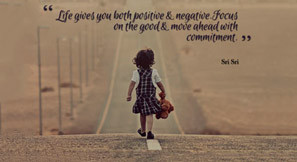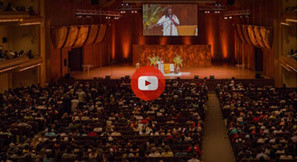"First you have to find happiness within yourself, then you can share it with everyone else.

Barkha Dutt: Ladies and gentlemen, welcome to our special series - The Townhall.
The Townhall is a program that brings the biggest news makers of India face to face with a LIVE audience; an audience that is also crucial as they make the energy of the program and they, in a sense, put forth questions to the news makers.
This program today is a very special addition of the Townhall. We are at The Art of Living International Centre which is on the outskirts of Bangalore. Please welcome our very special guest today, Gurudev Sri Sri Ravi Shankar.
Do you remember that moment when you knew that your life was going to take a very different turn from other children? Tell us a little about it.
In schools and colleges in those days, our biggest hobby was to collect stamps, currency, coins. One of my friends used to hanker for stamps and coins; they would be very happy to get some Italian lira; I used to tell them, “I am going to go all around the world and meet people. What is it that you want, I will give you?” I was around seven or eight at that time.
Did you know that you would grow up to have millions of followers?
I had some visions from time to time. I would see lots of people, crowds. I would see people that I would be meeting in the future. Sometimes, it would be scary. When my friends would come to ask my mother, “Do you really have a family all over the world?”
She would pull my ears and say, “Why are you lying?” I was called a liar as a child, and I had no answer. She thought that is the only thing I was lying for, as she knew I would not lie for anything.
Do you sometimes look back and think you miss the normalcy of human existence? What I mean is, a more conventional form of life. If you were not Guru Sri Sri Ravi Shankar,
what would you be?
Well, I could do many things. I could be a good cook, a good musician, a good talk show person! Anything I do, I think I do it well.
Is there a sense of loneliness on this path that you have chosen?
If that was the case, I would not have chosen this path. If you are lonely, then you will be upset and sad; then how can you exuberate joy? And the world is seeking happiness. If it is not within you, you cannot express it. You cannot share it and promote it. First you have to find happiness within yourself, then you can share it with everyone else.
You are almost like a smiling saint. Are you ever sad? Do you have moments of vulnerability, depression? I have only seen you ever smile. I can see people here wondering what is she asking? But you are also human. I’m wondering how a saint, a social leader deals with his own moments.
Well, it is very, very difficult to understand this situation. When I am with people, who are suffering, who are in deep distress, I am very much with them at that moment and that is what motivates me to help them out. This is a natural tendency I suppose. You can't say I am an island by myself. When you are with miserable people, when you are amidst people who have suffered a great calamity of tsunami or something like that, then you are there, their pain reflects in you. Every individual’s pain reflects in you. Yet, there is a part, an aspect in you that is totally untouched by anything else.
You have always said that reason and rationality can accompany spirituality. How do you deal with those who come to you with blind faith? I ask this because there is a word which is often debated in India, and that is ‘Godmen’, and some people believe in Godmen or Godwomen and some people are very cynical. And some people say, how can you have godly powers. I am wondering, how do you marry rationality and reason with spirituality?
There are four types of people who come on the spiritual path:
- Those who are suffering and who are in deep distress - at that moment, they only want to get out of that situation; nothing else matters.
- Those who are seeking some meaning in life - they want to know what is the purpose of life; they are inquisitive and want to know more.
- Those who are seekers of a different sense - they are seeking beyond what you see; seeker of a spiritual height.
- Those who have found some happiness, meaning to life - they want to come together and do service.
I find people of all types. In this country, we have always raised questions. Questioning and skepticism is most welcome but not cynicism. Cynical people are closed towards communication, they are not ready to listen; they are stuck with their own image of themselves or of the world. The spiritual path is that which opens the mind, the heart and heals the wounds; it gives hope for you to move on.
There is only one time when I have seen you angry; actually, that is too strong a word, maybe firm. This is about the entire collision that took place between The National Green Tribunal (NGT) and The Art of Living Foundation over the big World Culture Festival that took place at the banks of the Yamuna. You have been fined. You once told me that you would rather go to jail than pay this fine. Do you still stand by that?
The Court has again and again said that it is not fine, it is a deposit for compensation or restoration. The case is in the court; the hearing is happening. I am sure that we will get justice. I believe that truth will prevail.
One of the least reported works that you have done is work done in Jammu & Kashmir. I know that Burhan Wani, a militant who got killed, his father came to the ashram, met you and went back. I remember in an interview earlier you said that he is a pious man. Why did you choose to call the father of a militant a pious man? How would you say your conversation with him went, in terms of exploring possibilities of peace in Kashmir?
There is a saying by Kabir, ‘Bura dekhne mein chala, bura mila na koi.’ I don’t agree with the second stanza, which is, ‘Mujhse bura na koi’. I don’t agree with that because I don’t consider myself as bad. But I see some goodness in everybody. There is not a single human being on this planet who is devoid of goodness. And we need to encourage that goodness to come out. This is what I keep doing all the time.
You have met with governments, Burhan Wani’s father, separatists at the Huriyat Conference; you have become our informal Kashmir envoy, because you have worked with conflict areas earlier. What would be your prescription, what would you say should happen next?
The wounds need to be healed. And the mistrust that is running across society needs to be attended to. Proper leadership needs to come up; there is a serious lack of progressive leadership in Kashmir. It is easy to create dissatisfaction; arouse the emotions of people and create restlessness amongst them, get stones pelted, is not a very difficult thing to do. But to make them understand and give them progressive thinking, a way forward, needs the right mindset – a calm, collected mind, free from prejudice alone can do that; people who don't take sides can do better work there.
What would be your advice to the government? What would be your advice for some who say the Indian state should be tougher, some say that the PM should go stand at Lal Chowk there and address people. Which side would you choose – more tough, empathy or a combination?
As far as militants are concerned, you need to address the issue with some sternness, toughness. As far as the population is concerned, you need to care for them, have empathy, sympathy. You cannot go with one set of ideas; go with an open mind then solutions emerge spontaneously, on the spot.
You have been interacting with the army in Jammu also. Were you able to make any break through at the conference?
At Jammu, when we had the Peace Conference. People from Kashmir valley, mainly the youth (in those days, there was Sec 144 so we could not have it in the valley) - 1200 youth travelled from interior Kashmir for 12-15 hours to Jammu to be part of the conference, which was very moving. There were people from all different ideologies; people who wanted a separate state, youth of all denominations, but it was a very, very moving experience. We are doing some work; we are taking small tiny steps; let us see.
Would be willing to go back and talk to all stakeholders if the government asks you to take on that role?
I don’t need the government to ask me to do this. I am anyway doing it. I am anyway talking to people from all sides. I have met Hurriat leaders, I have met the religious leaders there, I have met Imams there. Some Imams have come here too and have stayed here for three to four days. We keep on talking to them. This is one aspect of what we are doing for conflict resolution in other parts of the world too. This has become one type of side dish for us, a routine.
What would you advise the government? Should they start some talk? Or first bring the law and order by force.
The government have their own intelligence. They know what they want to do and they do it. I only appeal to everybody, all the stakeholders to think on a long-term strategy with a calm and collected mind. Let go of the past. Half of the time in the meetings we keep on digging the past; including your shows. We should go forward from there. Let us think what pragmatically is possible? What is it that we can do to uplift the spirit or people. I am more concerned about this.
See, today happiness is the important factor. People have food, clothes and a place to live, but happiness is missing. What is the use of all these? We have to learn from the Western counties. Now they are focusing on the happiness factor. We also need to push forward to that and create the sense of belongingness in communities. When people live in their own isolated compounded communities, then there is more fear, anxiety, and all these sorts of negative emotions.

Subscribe
If you enjoyed reading this content and would like to receive a notification on our future updates, you can subscribe here.
You can also write to us on webteam.wisdom@artofliving.org for any questions or comments.

How to Face Your Mistakes and Move Ahead
Spontaneity is the sign of a vibrant life, and you can't be spontaneous if you are brooding over your mistakes. Here are 9 perspectives that can help you face your mistakes and move ahead.










